Sun 9 May 2010
A Movie Review by David L. Vineyard: GASLIGHT (1944).
Posted by Steve under Mystery movies , Reviews[13] Comments
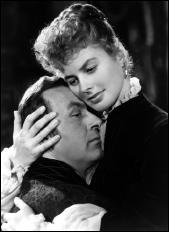
GASLIGHT. MGM, 1944. Ingrid Bergman, Charles Boyer, Joseph Cotton, Dame May Whitty, Angela Lansbury, Terry Moore. Based on the play Angel Street by Patrick Hamilton. Director: George Cukor.
It’s hardly necessary to go into much detail about the plot of this classic. Bergman is the daughter of a famous actress who was murdered and her jewels disappeared. Now she is married to the haughty and somewhat overly protective Charles Boyer, whose personality is as changeable as the weather — at one moment cloyingly concerned, at another insanely angry over the smallest of things — warm and affectionate at one turn, icy and cruel at another.
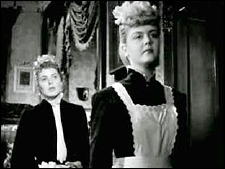
Into the mix is added the wonderful Angela Lansbury in her film debut at only seventeen as a house servant of notable disrespect, and Joseph Cotton as a young man who works at Scotland Yard and suspects something is not right in the supposedly happy household.
This is actually the second film of the play. It originated in London’s West End and then came to Broadway with Vincent Price in the Boyer role. In 1940 a British version of the play was made with Anton Walbrook, Diana Wynyard, Robert Newton, and Frank Pettingwell. In all fairness, this version is superior to the American version, and I don’t just say that because Diana Wynyard is a cousin. It is less static than the American version, with electrical performances and a fine sense of slowly dawning horror and madness.
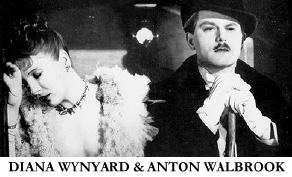
But the familiar version we are discussing here is a fine piece of film making with merits of its own. Bergman, Boyer, and Lansbury are at the top of their form (Bergman won an Oscar, though it may have been a consolation prize for the previous year’s Casablanca and For Whom The Bell Tolls), and Boyer seldom had a role as juicy as this (not even as Napoleon in Conquest with Greta Garbo). It’s hard to believe Lansbury’s assured and saucy performance is being given by a seventeen year old girl.
Gaslight is a psychological drama that turns on Boyer gradually driving Bergman mad so he can have free access to the house they share where her murdered mother’s fortune in jewels is hidden. The fine irony is that Boyer himself is insane and with each twist of the noose going madder north by northwest than Hamlet on uppers himself, so the finale when he has broken Bergman and she turns on him as Cotton’s Scotland Yard man waits is beautifully staged melodrama.
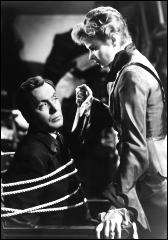
Cotton’s role in the film is much expanded from the play where Leo G. Carroll played the role as a much less romantic figure.
Patrick Hamilton specialized in these overheated psychological dramas. Hangover Square is only a little less potent than Gaslight and an excellent film in itself directed by John Brahm and starring George Sanders and Laird Cregar, with Cregar’s concert pianist going mad by delightfully increasing murderous degrees. Hamilton also penned some all too seldom read novels that prefigure some aspects of Patricia Highsmith’s Tom Ripley novels though in a different vein.
Gaslight is perhaps too familiar to have the impact it originally did on screen. The plot has become such a staple that the film has lost some of its glow, but it is still a fine piece of melodrama, and Bergman’s gradual descent into madness, and her worm turns scene when she realizes Boyer has been trying to kill her still has power.
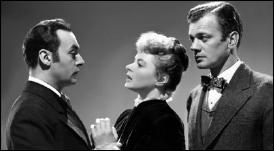
And while much of the attention has rightfully gone to Bergman and Lansbury, Boyer has a field day with his own descent into obsession and madness, though he lost out in the Oscar race to Bing Crosby’s singing priest in Going My Way.
To give some idea of the impact of both play and film, there are few people even today who would fail to recognize the term ‘gaslighting’ as a metaphor for driving someone mad, even if they have never seen or heard of the film or play. It’s not often a film enters so firmly into the public consciousness.
[UPDATE] 05-11-10. The 1944 version of Gaslight will be shown on TCM next Friday (May 14) at 10:30 am.
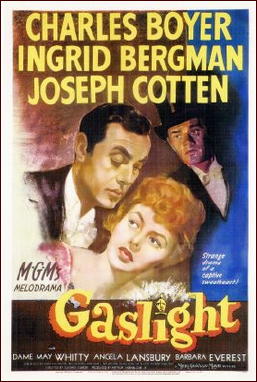
May 9th, 2010 at 7:32 pm
Is the original version available on DVD, I had read it about before and wanted to see it. I agree about Lansbury, she’s good and saucy!
I liked Hangover Square. Almost as amazing as the finale is Laird Cregar’s weight loss! Which, I gather, actually killed him, tragically.
May 9th, 2010 at 7:52 pm
Curt
The US version of GASLIGHT is easily available on DVD; Amazon, for example, but almost any vendor will have it.
I also see that one of the DVD sets that Amazon offers comes with the 1940 British edition as well, if that’s one you’re looking for also. But at $4.99 for two movies, you have to wonder what the quality might be.
Not that I’m pushing Amazon. It’s just where I happen to go looking first.
— Steve
May 9th, 2010 at 8:22 pm
The 1940 version shows up fairly regularly on TCM usually in tandem with the MGM version.
May 10th, 2010 at 3:26 am
Steve, yeah I’m afraid at 4.99, the quality would be pretty dire. I think I read somewhere the studio behind the second version tried to have all the copies of the earlier film destroyed?
This article reminds me that I haven’t seen the Bergman version in over a decade, need to watch again.
May 10th, 2010 at 5:37 am
When I finally saw the Bergman version I was disappointed. I kept thinking, she won an Oscar for this?
May 10th, 2010 at 5:57 am
The Bergman version is a good one, but it suffers from being a little too long. The 1940 version is a very tight 88 minutes, which allows the director, Thorold Dickinson, to keep the tension nicely wound up. Like you, I think the earlier version is the better one, but there is a lot to like in the remake. For me, the big mistake was to replace the burly, unconventional, retired detective played by Frank Pettingell in the original, with Joseph Cotten. They should have gone with someone like Sidney Greenstreet. I would have loved to have seen him in the pivotal scene, where Paul has convinced Bella that she is mad, and that all her suspicions were a dream. “Was I a part of this curious dream?” booms Rough, his shadow appearing on the doorway.
I was surprised that you didn’t mention Hamilton’s other really big hit ROPE. The play was recently revived in London to rave reviews. The makers went with the original script, with Bertie Carvel giving a superb performance as Rupert-the openly gay, cynical War Poet who eventually rediscovers his moral core when he denounces the two killers at the end of the play.
Hamilton always seems on the verge of being rediscovered. In the 80s, British TV adapted the Gorse books as THE CHARMER, with Nigel Havers as the Neville Heath-like villain (they even supplied an ending to the story). More recently the BBC adapted the semi-autobiographical TWENTY THOUSAND STREETS UNDER THE SKY for TV. I’ve always found that Hamilton works best in small doses. His world view is simply too bleak to take for too long.
May 10th, 2010 at 6:09 am
As an afterthought: Don’t you think that Angela Lansbury is the most underrated actress in Hollywood history? She’s been consistently good in everything that she’s ever done, and her performance in THE MANCHURIAN CANDIDATE really should have won her that Academy Award nomination.
I have to say that, having seen her playing everyone’s favourite Auntie/Granny in BEDKNOBS AND BROOMSTICKS or MURDER SHE WROTE, it can be quite unnerving to come across her 1940s performances in things like DORIAN GRAY or SAMSON AND DELILAH. She really was a rather sexy young woman!
May 10th, 2010 at 6:46 am
Mt favorite Lansbury was in THE COURT JESTER. And I’ve noticed over the years that every time she tells about her debut in DORIAN GRAY she says she was younger.
As for GASLIGHT, I’ve seen the 1940 version and I prefer the re-make. Boyer is smoother than Walkbrook and there’s a nice moment in the MGM film where Bergman asserts herself (not in the original) that is the true climax of the story.
May 10th, 2010 at 5:19 pm
BRADSTREET: Angela Lansbury was nominated for an Oscar for THE MANCHURIAN CANDIDATE, but lost to Patty Duke for THE MIRACLE WORKER.
May 10th, 2010 at 5:39 pm
I know. I was saying that she should have gone on to win the actual Oscar, rather than just being nominated(although I can see how you could have read it differently). Whatever I said, I still think that it’s a wonderful performance.
May 10th, 2010 at 7:18 pm
For me it would be hard to top Lansbury in MANCHURIAN CANDIDATE, but through that whole period she did a series of excellent roles, but it is striking how fresh, sexy, and sharp tongued she is in these early films. She had a another shot at a role not unlike GASLIGHT in 1951’s KIND LADY with Ethel Barrymore and Maurice Evans.
Dan
THE COURT JESTER has an embarrassment of riches from Danny Kaye’s best role to Glynis Johns, Basil Rathbone, Mildred Natwick, Cecil Parker, and Robert Middleton angry knight. “The vessel with the pestle has the brew that is true …” Get it? Got it? Good! Lansbury is wonderful as the spoiled and dare we say it — horny — princess whose desires fire much of the increasingly antic sub plot. Even the songs are great. One of the funniest comedies ever made.
Though I prefer the much tighter 1940 version of GASLIGHT, I wouldn’t dimiss the excellent MGM release. I do think it could have been tighter and George Cukor’s direction a bit sharper, but much of the added length has to do with the expanded role of Joseph Cotton’s character.
Bradstreet
Leo G. Carroll played the Cotton role on Broadway, and most of the sub-plot involving him was considerably shorter. I think MGM felt they had to have a romantic lead though.
You know I didn’t even think of ROPE? You are right of course.
Glad to know there was a production of the Gorse book.
May 11th, 2010 at 11:51 am
I bought the dvd during Amazon’s $5.79 sale though i’ve yet to look at it. I thought Lansbury was very fine as another rotten mother in THE WORLD OF HENRY ORIENT.
May 19th, 2010 at 5:47 pm
thanks, everybody for their comments. This was really helpful.